Episode Description
Blog Post:
Reflections on my Interview with Laura...
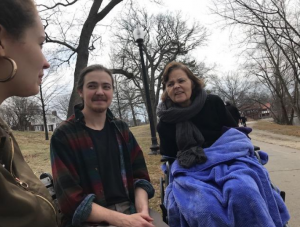 When I was figuring out who I wanted to interview for The Shape of Care podcast, I posted a note on Facebook, asking for suggestions of people who were caring for a loved one. Later that week, I ran into Laura Barr and her wife, Jean, in the local Arboretum. Laura mentioned that she had seen my Facebook post, and that she wanted to talk. But when I asked her what she wanted to talk about, she hesitated, quickly flashing her eyes towards Jean and then back at me. Lowering her voice a bit, she said, “I can’t talk now”.
When I was figuring out who I wanted to interview for The Shape of Care podcast, I posted a note on Facebook, asking for suggestions of people who were caring for a loved one. Later that week, I ran into Laura Barr and her wife, Jean, in the local Arboretum. Laura mentioned that she had seen my Facebook post, and that she wanted to talk. But when I asked her what she wanted to talk about, she hesitated, quickly flashing her eyes towards Jean and then back at me. Lowering her voice a bit, she said, “I can’t talk now”.
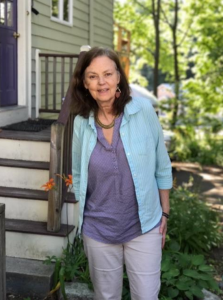 I had known Laura since our kids were little. She and her wife, Jean, and their two kids lived across the street from a very good friend. So I ran into them from time to time. And because we live in a small community, our paths crossed in other informal ways, on the street, at the playground, or at JP Licks, the local ice cream shop. Our kids are now grown, and when I saw Laura and Jean in the Arboretum that day, we hadn’t seen each other for years. And now she wanted to talk. My heart sank, as I realized in that moment that something was awry with Jean, who stood quietly and somewhat absently next to Laura, with a slight smile on her face.
I had known Laura since our kids were little. She and her wife, Jean, and their two kids lived across the street from a very good friend. So I ran into them from time to time. And because we live in a small community, our paths crossed in other informal ways, on the street, at the playground, or at JP Licks, the local ice cream shop. Our kids are now grown, and when I saw Laura and Jean in the Arboretum that day, we hadn’t seen each other for years. And now she wanted to talk. My heart sank, as I realized in that moment that something was awry with Jean, who stood quietly and somewhat absently next to Laura, with a slight smile on her face.
I obviously followed up with Laura (!), and I’m so glad I did. As you can see from Episodes 4 and 5, Laura has a unique perspective on caregiving, as she seeks to maintain a good quality of life for herself, Jean and their two adult children.
There are a few things that struck me about Laura’s situation, and I’d be curious to know what you think when you listen to episodes 4 and 5.
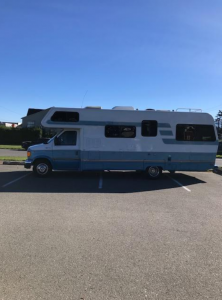 First, I was struck by the power of Laura’s sense of loyalty, fueling her efforts to be there physically and emotionally for Jean throughout her decline. I’m also struck by Laura’s creativity in finding ways to bring joy into their lives together. Who wouldn’t have fun taking camper trips and playing with Panda! Laura has also adjusted to each stage of the disease, as Jean became less active. For example, when camping got too hard, Laura took Jean on long drives. And when Jean couldn’t stand up, Laura was playful with her, using a trick that, at least initially, got Jean to stand up. But with each stage, things have gotten sadder and harder.
First, I was struck by the power of Laura’s sense of loyalty, fueling her efforts to be there physically and emotionally for Jean throughout her decline. I’m also struck by Laura’s creativity in finding ways to bring joy into their lives together. Who wouldn’t have fun taking camper trips and playing with Panda! Laura has also adjusted to each stage of the disease, as Jean became less active. For example, when camping got too hard, Laura took Jean on long drives. And when Jean couldn’t stand up, Laura was playful with her, using a trick that, at least initially, got Jean to stand up. But with each stage, things have gotten sadder and harder.
I’m also struck by Laura and Jean’s caring network of family and friends who support them. Primary in this network are their two children, Maddy and Devin. Their circle of love has fed them all, emotionally.
 And I was taken by how lucky Laura is to work in a supportive office that allowed her to work flexible hours, particularly when Jean was still living at home. According to the U.S. Department of Labor, around 56% of American workers are allowed to vary the times they start and stop their work day. That means that nearly one-half of the labor force does not have access to flexible work schedules. In fact, there is no federal policy protecting the rights of workers to have flexible work hours. That means that flexible work policies are only enacted company by company.
And I was taken by how lucky Laura is to work in a supportive office that allowed her to work flexible hours, particularly when Jean was still living at home. According to the U.S. Department of Labor, around 56% of American workers are allowed to vary the times they start and stop their work day. That means that nearly one-half of the labor force does not have access to flexible work schedules. In fact, there is no federal policy protecting the rights of workers to have flexible work hours. That means that flexible work policies are only enacted company by company.
And in 2017-2018, only 25% of wage and salary workers were able to telecommute (e.g., work at home) at least occasionally. And only 15% of these workers reported they had days in which they only telecommuted.
We need federal legislation that supports companies to create flexible work hours for workers. In a study I directed on corporate flexible work policies, I found that flexible work hours allowed employees to juggle their work and family responsibilities. Workers more satisfied with their jobs because of the policy; they missed fewer days of work; they were more committed to the job; and they were considered more productive by their supervisors. In a Harvard Business Review article, written by Sarita Gupta and Ai-jen Poo (feature in Episode 2 of The Shape of Care!), write,
Until now, the burdens of this new world have fallen on workers, not their employers. Fully 68% of working family caregivers report making adjustments at work such as arriving late or leaving early, taking time off, changing jobs, turning down a promotion, or cutting back on hours. Workers in the “sandwich generation” — so called because they have to care for both children and parents — are likely to be hit the hardest; according to Gallup workforce data reported in Fast Company, about one-third of American managers are part of Generation X. A full 11% of them care for an elderly or disabled person, while 64% have children living at home. Millennials are now being affected as well, making up about 25% of the nation’s family caregivers; like members of Generation X, many of their parents are aging Baby Boomers. Older workers are affected, too: 19% report retiring early, not because they’re ready to leave the workforce, but because they need to care for a spouse or other family member.
Companies are failing to meet the needs of some of their most experienced and talented workers across the generations. What’s more, they risk losing these workers to companies that are on the cutting edge of responding and adapting to caregiving responsibilities brought on by an aging nation.
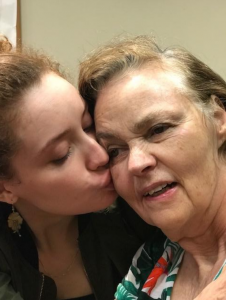 Finally, I am struck by Laura’s openness to thinking about life after Jean is gone. This is extraordinarily painful stuff, but some people – including Laura – find it helpful to talk about that reality. Many caregivers I’ve spoken find they need to think about life without their loved one. It helps them prepare for that reality, emotionally and practically. And this is where Laura’s adventurous spirit materializes, as she fantasizes taking off in her new RV, without a set plan. This is her lifeline into the next chapter of her life.
Finally, I am struck by Laura’s openness to thinking about life after Jean is gone. This is extraordinarily painful stuff, but some people – including Laura – find it helpful to talk about that reality. Many caregivers I’ve spoken find they need to think about life without their loved one. It helps them prepare for that reality, emotionally and practically. And this is where Laura’s adventurous spirit materializes, as she fantasizes taking off in her new RV, without a set plan. This is her lifeline into the next chapter of her life.
Guest Bio:
Laura Barr
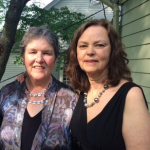 Laura Barr is a long-time resident of Jamaica Plain, MA. She and her partner of 39 years, Jean O’Leary, have raised two amazing kids, Devin and Maddy, with the help of a wonderful community of friends/ Sadly, Jean was diagnosed with early onset Alzheimer’s in 2012, and Laura has spent the intervening years caring for her and trying to make the happiest life possible for both of them. Now that Jean is living in a skilled nursing facility, Laura continues to visit her regularly, and also takes short trips in her RV camper. She’s looking forward to retirement when she can hit the road with her adorable pup Panda.
Laura Barr is a long-time resident of Jamaica Plain, MA. She and her partner of 39 years, Jean O’Leary, have raised two amazing kids, Devin and Maddy, with the help of a wonderful community of friends/ Sadly, Jean was diagnosed with early onset Alzheimer’s in 2012, and Laura has spent the intervening years caring for her and trying to make the happiest life possible for both of them. Now that Jean is living in a skilled nursing facility, Laura continues to visit her regularly, and also takes short trips in her RV camper. She’s looking forward to retirement when she can hit the road with her adorable pup Panda. Articles about the impact of Alzheimer's Disease on Caregivers
Finding Joy in Alzheimer’s by Robert Leleux, NY Times, 2/16/12
Alzheimer’s Disease and Caregiving, Family Caregiver Alliance
Caregiver Stress, Alzheimer’s Association
Impact of Alzheimer’s Disease on Caregivers, American Senior Communities, 10.14
Alzheimer’s Disease and Family Conflict, Mayo Clinic
Fighting Alzheimer’s as a Family in Conflict, by Barry Jacobs, AARP, October 18, 2018
Resources
Help for Alzheimer’s Caregivers, Support, resources, advice for a difficult, draining job
by Chris Woolston, AARP Bulletin, October 18, 2010
Alzheimer’s Association
The Alzheimer’s Association works on a global, national and local level to provide care and support for all those affected by Alzheimer’s and other dementias. They offer help through a professionally staffed 24/7 Helpline (1.800.272.3900), face-to-face support groups and educational sessions in communities nationwide, and comprehensive online resources and information through the Alzheimer’s and Dementia Caregiver Center
Alzheimer’s Foundation of America
The Alzheimer’s Foundation of America offers a national, toll-free helpline (866-232-8484) staffed by licensed social workers, educational materials, a free quarterly magazine for caregivers and “AFA Partners in Care” dementia care training for healthcare professionals. For more information about AFA, call 866-232-8484, visit www.alzfdn.org.
The Association for Frontotemporal Degeneration (AFTD)
AFTD promotes and funds research into finding the cause, therapies and cures for frontotemporal degeneration. They also offer information, education and support to persons diagnosed with an FTD disorder, and for their families and caregivers. To learn more about AFTD, visit www.theaftd.org
The Lewy Body Dementia Association (LBDA)
LBDA works to raise awareness of Lewy body dementias (LBD), promoting scientific advances, and supporting people with LBD, their families, and caregivers. LBD is a complex disease that can present a range of physical, cognitive, and behavioral symptoms. It dramatically affects an estimated 1.4 million individuals and their families in the United States. To learn more, visit www.lbda.org
Alzheimers.gov – For the People Helping People with Alzheimer’s
Resources from the Administration for Community Living on Alzheimer’s disease and other forms of dementia.
National Institute on Aging: Alzheimer’s Disease Education and Referral Center
Resources from the National Institutes of Health on Alzheimer’s disease and other forms of dementia, including information on clinical trials and current advances in scientific research.
U.S. Department of Veterans Affairs: Dementia Care (including Alzheimer’s)
For those caring for a Veteran, resources on dementia care through the VA and information on new research on dementia in Veterans.
U.S. Department of Veterans Affairs: Dementia Care (including Alzheimer’s)
For those caring for a Veteran, resources on dementia care through the VA and information on new research on dementia in Veterans.